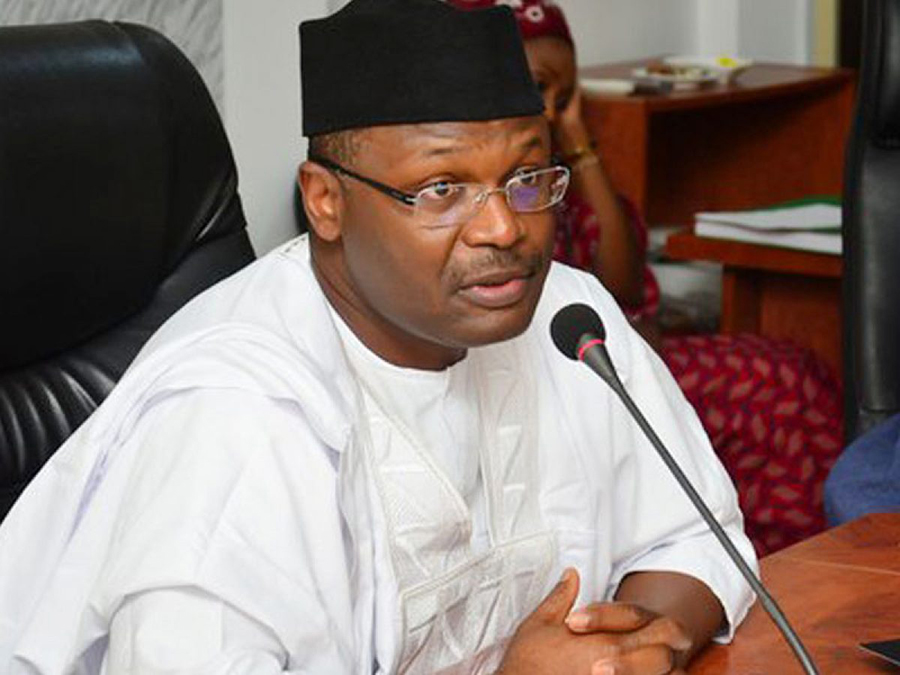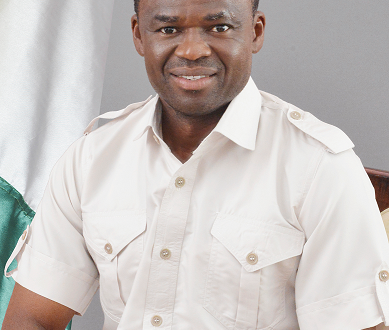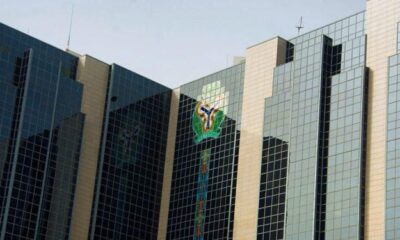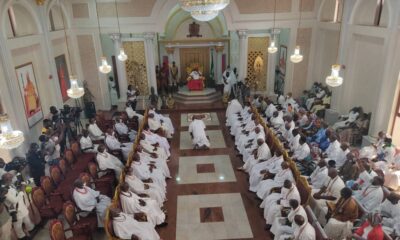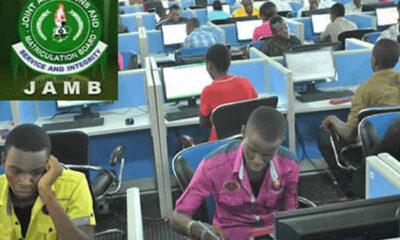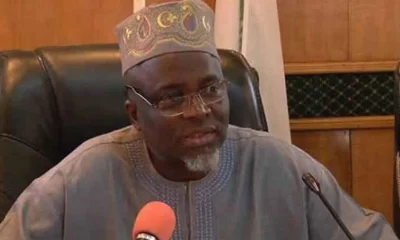Headline
How Nigeria Spent N207 Billion On 68 million Nigerians Who Didn’t Vote
Published
1 year agoon
By
Editor
N207 billion may have been expended on 68 million Nigerians who registered to vote in the 2023 elections but for one reason or another ended up not being able to perform that civic responsibility.
The inability to vote has been blamed on alleged shoddiness on the part of the Independent National Electoral Commission (INEC) whose officials arrived late for polls commencement and could not attend to most of the potential voters who had stormed polling units across the nation before the election closed, relocation from Nigeria and death among others.
Meanwhile, a source at INEC has absolved the Commission’s Chairman, Professor Mahmood Yakubu, of blame on some of the issues that attended the polls, saying the electoral management body’s (EMB) boss did all he could to deliver Nigeria’s freest and fairest election but some “human factors” stopped him.
He listed the factors to include unanticipated glitches associated with the technology deployed and the activities of what he called partisan Resident Electoral Commissioners (RECs).
The INEC Chairman has come under harsh criticism for the way the polls were handled and declaration of Senator Ahmed Bola Tinubu of the All Progressives Congress (APC) as winner of the presidential election with the celebrated writer, Chimamanda Adichie, being the latest high profile Nigerian to say the EMB disappointed the people.
Indeed, the two main opposition presidential candidates (Alhaji Atiku Abubakar of the People Democratic Party (PDP) and Mr Peter Obi of the Labour Party, LP), among others, are at the tribunal to challenge the outcome of the poll.
READ ALSO: inecAkwa Ibom: INEC Cancels Ikono/Ini Federal Constituency Return, Gives Reason
Polling ought to have opened with accreditation at 8. 30 a.m. and voting immediately while the exercise should close at 2. 30p.m. but in many polling units across Nigeria, accreditation didn’t start until noon and in some cases the evening of February 25, the first day of election when Nigerians voted for their next President, senators and members of the House of Representatives.
Many people left polling units in frustration while those who were prepared to wait ultimately couldn’t vote because officials closed without attending to them.
Of the 93 registered voters across Nigeria for the 2023 polls, only 25 million voted in the February 25 elections, leaving 68 million unable to participate in the exercise.
And for the March 18 governorship and House of Assembly polls, the turnout was worse. Estimated 21 million people voted.
Voter turnout for the elections is the worst since the 2011 polls.
Whereas the number of registered voters in Nigeria’s elections declined from 73 million in the 2011 polls to 67 million in 2015, it moved up to 82 million in 2019 and 93 million in 2023.
READ ALSO: Supplementary Polls: NNPP Wins More State Assembly Seats In Kano
Poor turnout figure
Meanwhile, turnout was 39 million in 2011, reduced to 29 million in 2015, remained at 29 million in 2019, before moving to 25 million (presidential and National Assembly polls) and 21 million (governorship and House of Assembly polls) in 2023.
Analysts said the poor turnout figure recorded in the 2023 polls could not be blamed on apathy given that Nigerians across the country, especially youths, expressed willingness to vote, a situation that apparently led to the upsurge in voters’ registration in the INEC continuous voters’ registration exercise which inevitably added 11 million voters to the register used for the 2019 elections.
Vanguard findings showed that INEC may have put the cost per voter for the 2023 elections at an estimate of $5.39, with a target of 100 million registered voters for the polls, using the N565 to $1 parallel market exchange rate as of April 2022 (10 months ago) when it released its Election Project Plan (EPP) document.
Projected budget as of that time was N305 billion.
But the election management body (EMB) ended up registering 93 million voters, seven million down from its estimated 100 million.
In essence, instead of spending N305 billion on 100 million voters, the budget ought to have come down to N298 billion for 93 billion registered voters (at N3, 207 per voter).
READ ALSO: Armed Youths Invade INEC Office As APC, PDP Clash In Port Harcourt
Further calculation shows that of the 93 million registered voters, only 25 million voted in the February 25 polls, meaning that N207 billion was earmarked for the remaining 68 million voters who could not exercise their civic responsibility while estimated 21 million voted on March 18.
Meanwhile funds were used to procure ballot papers among other items for the polls.
For instance, 93 million papers would have been printed for each of the three segments of the February 25 elections, that is, one each for the presidential, Senate and House of Representatives polls.
At the end of the day, only 25 million each voted. 68 million couldn’t.
For the March 18 polls, 21 million voted, but whereas a little lower than 93 million ballot papers would have been printed for the governorship segment of the exercise because it was holding in only 28 states, the entire 93 million would have been printed for the House of Assembly segment because the election was holding in the entire 36 states.
The actual cost of printing of the ballots could not be ascertained at press time.
Provision would have also been made for the printing of result sheets.
READ ALSO: Ex-PDP Senator Clinches Imo Labour Party Governorship Ticket
There were other expenses including personnel emoluments for the elections which would not have changed the amount spent by the country had more voters exercised their franchise in the 2023 polls.
But there were also expenses incurred on equipment like the newly introduced Bimodal Voter Accreditation System (BVAS) machines and vehicles which use are not limited to the 2023 polls as they can still be used in subsequent polls and, therefore, according to analysts, the cost cannot be calculated per voter in this year’s elections.
EPP document
Recall that INEC had proposed in April 2022 the sum of N305 billion for the conduct of the 2023 general elections.
This was contained in the commission’s EPP document unfolded during the EMB meeting with the media ahead of the 2023 general elections.
According to the document, INEC would need N305 billion to conduct the polls.
The document gave a breakdown of what each department of the commission would require as its budget for the general elections.
According to the EPP document, INEC has 23 departments and directorates.
READ ALSO: Lagos Police Recover Firearms From Fleeing Suspects
INEC said, “For established and stable democracies, the average cost per voter is pegged at $1 to $3. In transitional democracies, it ranges from $4 to $8, while the cost is fixed at $9 and above in post-conflict and some transitional democracies.”
Because of this, the commission said that elections tend to be more costly in nascent democratic countries.
Accordingly, INEC put the cost per voter for the 2023 election at an estimate of $5.39, with a target of 100 million registered voters for the election, using the N565 to $1 parallel market exchange rate, the commission quoted in its EPP document.
As a result, the actual figure is N304.54 billion, representing a 61.37 per cent increase over what was spent to conduct the 2019 general elections.
The EPP report said that INEC spent N189.2 billion to conduct the 2019 general elections, explaining that the cost per voter was fixed at $6.24 at an exchange rate of N305 with a total of 84 million registered voters.
In real terms, the cost per voter for the 2023 election reduced compared to 2019 ($5.39 against $6.24 in 2019), but the exchange rate has skyrocketed since the 2019 general elections.
READ ALSO: BudgIT Demands Breakdown Of N896bn NPC Budget
In addition, the increase in the number of registered voters — one of the determinants for planning election budgets — and the creation of 56,873 new polling units, among others, may also account for the increase in the proposed budget for the 2023 elections.
An analysis of the 2023 proposed election budget showed that nine items accounted for 76.68 per cent of the total budget. Procurement of accreditation devices was earmarked to take the bulk — 34.51 per cent of the entire budget – while provision for run-off elections was 8.89 per cent of the budget. Honoraria for ad hoc staff, logistics, and printing of ballot papers covered 7.79 per cent, 7.54 per cent, and 6.78 per cent, respectively.
On funding the 2023 elections’ budget, INEC explained that the Federal Government would provide the required funds for the commission to cover the fixed and direct costs.
INEC further explained that although it was not reflected either in the fixed budget of the commission or in the core costs for the conduct of elections, it will also receive support from development partners for some of its electoral activities such as training, capacity building, civic and voter education, production of information, education and communication materials, and engagement with stakeholders. It said all these were geared towards strengthening the integrity of the electoral process, promoting citizens’ participation, and enhancing advocacy for inclusivity concerning women, youths, persons with disability and other marginalised groups.
“For the 2023 elections, INEC has projected 100 million registered voters, proposing N305 billion to conduct the election. With the country’s declining voter turnout rate, the possibility of a huge waste of funds is quite concerning. To prevent another situation of huge resources going to waste as a result of lower voter turnout, the electoral commission may need to adopt workable measures to ensure more participation at the 2023 polls”, the EPP had said
Voting materials
The document said that INEC will spend not less than N239.2bn on procuring voting materials and vehicles that will be used in the 2023 general elections.
READ ALSO: JUST IN: EU Mission Knocks INEC, Says Violence, Vote-buying Marred Gov Polls
It also said that N239.2bn, which constituted 78.44 per cent of its N305billion budget, would be spent on 10 critical items which included ballot papers, operational vehicles, ballot boxes, allowances of ad hoc workers, the printing of result sheets, logistics and procurement of accreditation devices.
Part of the proposal in the N239.2billion budget was the N27.1billion set aside by the commission for possible run-off elections, including the one for the presidential poll.
A breakdown of the document, 2023 EPP indicated that the highest single component will be the procurement of accreditation devices which will gulp N105.2billion. This also constituted 34.51 per cent of the total election budget of N305bn.
The allowance for ad hoc workers, who will be more than one million people, was pegged at N23.7billion while N23billion was set aside for election logistics expenses which included the movement, deployment and retrieval of men and materials for the elections.
INEC was also expected to spend N20.6billion on the printing of ballot papers and N12.7billion on the procurement of non-sensitive materials.
According to the VANGUARD, the commission set aside N9.5billion for the printing of result sheets, N7.8billion for the procurement of ballot boxes and a separate N5.39billion for the same purpose. The electoral body was also expected to spend N3.9billion on the procurement of operational vehicles.
READ ALSO: Armed Youths Invade INEC Office As APC, PDP Clash In Port Harcourt
The Yakubu story
Defending Yakubu on the flaws in the polls, the INEC source, who spoke on the condition of anonymity because he was not authorized to speak on the issue owing to the sensitive nature of the matter, cited the Chairman’s quest to use technology to drive credible polls which, according to him, motivated the use of BVAs and IREV.
“It was for the reason of ensuring credible polls that the INEC boss resorted to the use of technology which was a clear departure from the past when polls were blatantly rigged by politicians altering election results at will”, he said.
“And we saw all the attempts some politicians, even parties made to abort the use of technology for the polls. Some people even went to court about four times and there were also efforts to remove Yakubu on this premise but he stood his ground.”
The INEC source said the Chairman was vindicated as post-election investigation showed that BVAS performance at the polls was over 98% successful.
On the alleged shutdown of the presidential portal of IREV to sabotage the system and influence the outcome, the source said nothing could have been further from the truth.
According to him, it was in an effort to prevent hacking into the system that necessitated the shutdown for a while.
READ ALSO: Enugu Govt Seals Hotel Where INEC Issued Certificates Of Return
He noted that whereas the portals for other elections, including the governorship, senatorial, House of Representatives and House of Assembly, had been tested to near perfection in off cycle polls (Ondo, Ekiti, Osun, Anambra, Edo), INEC never had the opportunity before the 2023 polls with a view to testing its effectiveness.
“The server operator was based in the UK”, he said.
Narrating what happened that inevitably gave the impression that the presidential portal was deliberately shut down by saboteurs determined to manipulate the outcome of the result, the source said: “The server operator was baffled by the volume of data and other things entering the portal on February 25 and thinking that hackers could have been at work and in their panicking situation, they shut down the portal.
“The shutdown was the reason the portal couldn’t take the presidential election results uploaded into the IREV from polling units whereas the senatorial and House of Representatives portals were uploading.
“But there were a local back up in Abuja which was activated immediately but it also generated some issues which led to a situation whereby one state result went to another state as shown on the IREV.
“Meanwhile, the issues were corrected when the server operators in the UK restarted the presidential election portal”.
On whether the portal shutdown could have affected the integrity of the presidential election, the source said no.
READ ALSO: 2023: INEC Gives Update On Supplementary Polls
“The portal has the capacity to store uploaded documents and alter send to IREV without any form of tampering”, he added.
According to him, those vilifying Yakubu should understand that were it not for the technology he introduced into the polls, it would have been difficult for those who now have access to BVAS which stored all the information they can now use to challenge the declaration of winners in the elections at the tribunal to do so.
Speaking on how the activities of some RECs impacted negatively on the outcome of the polls, the source said some of them were clearly partisan, saying it was unfair to now blame such activities of RECs on the EMB Chairman as they were outside of his control.
“For instance, about 19 RECs were appointed close to the polls and as it turned out many of them were clearly partisan and to make matters worse some were deployed to states where they had sympathy for the ruling parties”, he pointed out.
“Should we also blame INEC or the Chairman for this?”
The source noted that it is only INEC out of the agencies of government that participated in the election that has carried out disciplinary measures against erring staff to the extent of recommending to President Muhammadu Buhari the sacking of two RECs who had been found wanting in their conduct in the polls.
VANGUARD
You may like


Edo Guber Final List : Group Knocks LP, Commends, INEC, Yakubu


Full List: INEC Displays Edo Governorship Candidates Of Political Parties


19 Parties To Feature In Ondo Governorship Election – INEC


INEC Disowns LP’s National Convention


INEC To Publish Edo Gov Candidates’ Credentials Saturday


INEC Gives Updates On Edo, Ondo Guber Polls
Headline
PHOTOS: Sandhurst Trained: UK High Commissioner Hosts First Nigerian Female To Graduate From Premier British Military Institution
Published
2 hours agoon
May 3, 2024By
Editor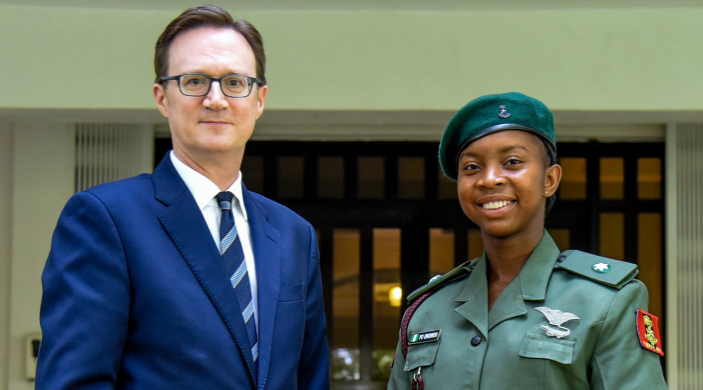
The British High Commissioner to Nigeria, Richard Montgomery, has congratulated Princess Owowoh on making history at the United Kingdom’s Royal Military Academy Sandhurst (RMAS).
Taking to X.com on Thursday, Montgomery expressed his pleasure in meeting Owowoh, who was accompanied by an officer from the Nigerian Defence Academy.
Sharing photos, he wrote, “I was pleased to meet 2nd Lt. Princess Owowoh, the first Nigerian female officer cadet to graduate from the UK’s
#RMASandhurst, accompanied by Lt. Col Nyiam from the #NDefenceAcademy to congratulate her on making history, hear about her experience, and reflect on our Nigeria-British relationship.”
READ ALSO: Shell Set To Build Gas Pipelines In Oyo
Owowoh graduated from the RMAS as the first-ever Nigerian female officer on April 12.
She joined the NDA in Kaduna in 2018, where she was appointed as a cadet lance corporal in her second year.
She rose to a cadet sergeant in her fourth year and was appointed company senior under Officer Charlie (CSUO C) in her fifth year.
Owowoh held the appointment with two other female counterparts and made history by becoming the first female to hold the position of CSUO at the academy.
During her fourth year, she completed the academic component of the commissioning course, achieving first-class honours in biological sciences.
See the photos below:


Headline
PICTORIAL: C&S Church Ayo Ni O Installs New Leader
Published
21 hours agoon
May 2, 2024By
Editor
The Cherubim and Seraphim (S&S) Movement Church Worldwide, on Wednesday, formally installed Prophet Emmanuel Alogbo as the 6th Baba Aladura and spiritual head of the church.
Alogbo was appointed the acting spiritual head in November 2023 following the death of his predecessor, Samuel Abidoye, who died on November 12, at the age of 103.
A statement published on the official website of the church reads, “The ascension of Most Senior Special Prophet Dr. Emmanuel Abiodun Alogbo to the revered position of Spiritual Father and Chairman of the Cherubim and Seraphim Movement Church signifies a pivotal moment in the history of the church, ushering in a new era of leadership and guidance for its global congregation.”
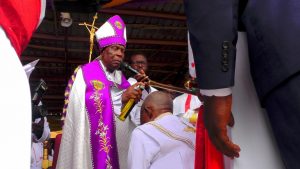
READ ALSO: Officer Who Shot Man Dead During Fuel Queue Tumult Identified — Lagos Police
Alogbo’s installation was reported to have been attended by important figures in the church, “including the Olori of Cherubim and Seraphim Unification, His Most Eminence Pro. Dr. S. A. Alao J.Pil., who performed the anointment, which added to the solemnity and grandeur of the occasion.”
Alao was said to have charged the new Baba Aladura to embrace his role with strength and courage.
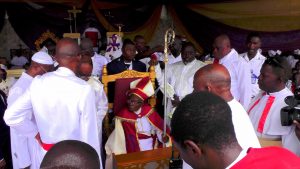
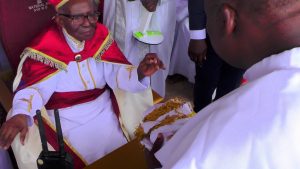
Congregants were also said to have recognised Alogbo as an embodiment of divine wisdom, compassion, and spiritual insight.
In his pledge to the CSMC Worldwide, the new Baba Adura was quoted assaying, “I solemnly pledge to continue the good work of moving our beloved church forward, which the late Baba Aladura Prophet Samuel Adefila Abidoye started.
“It is my firm commitment to ensure that the C&S Movement Church continues to march on, spreading its message of faith and love to all corners of the globe.”
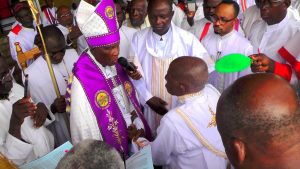
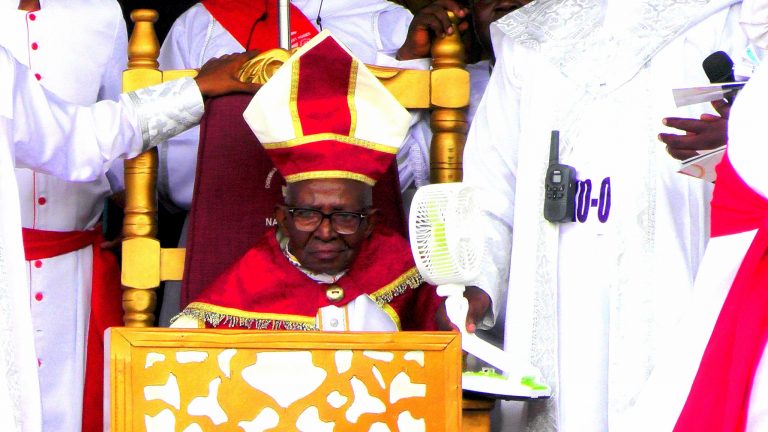
Headline
Nigerian Man Extradited From Malaysia, Convicted For $6.3m Fraud In US
Published
24 hours agoon
May 2, 2024By
Editor
A federal jury in New Haven, Connecticut, Wednesday, convicted an extradited Nigerian national, Okechukwu Osuji, for engaging in a business email compromise scheme out of multiple countries, including the United States.
This was revealed in a statement by the US Department of Justice on Thursday, saying that Osuji and his accomplices, John Wamuigah and Tolulope Bodunde defrauded their victims of over $6.3 million.
The jury convicted Osuji of conspiracy to commit wire fraud, wire fraud, and aggravated identity theft.
Principal Deputy Assistant Attorney General Nicole M. Argentieri, head of the Justice Department’s Criminal Division, said, “Osuji led a network of scammers in Malaysia and elsewhere in a sophisticated business email compromise scheme to defraud victims of millions of dollars.”
READ ALSO: Nigerian Sues Malaysia Govt N406m For Unlawful Detention
“Today’s conviction is another example of how the department’s collaboration with international law enforcement partners enables us to bring cybercriminals to justice in the United States.”
US Attorney Vanessa Roberts Avery for the District of Connecticut added, “While it is often difficult to identify and bring to justice cybercriminals operating overseas, today’s verdict demonstrates the expertise of the FBI and Stamford Police in uncovering this criminal network, and the shared commitment of our counterparts in Malaysia to ensure that fraudsters are held accountable in a court of law.
“We will continue to work to root out those who engage in internet fraud schemes, no matter where in the world they operate, and achieve justice for victims of these crimes.”
“The defendant perpetrated a complex international business email compromise scheme and laundered millions in stolen proceeds,” said Executive Assistant Director Timothy R. Langan Jr. of the FBI’s Criminal, Cyber, Response, and Services Branch.
READ ALSO: EFCC Arraigns Nigerian Who Posed As Woman To Dupe Malaysian
“This conviction is the result of hard work and close collaboration between the FBI and our local and international partners. Together, we will work aggressively to bring to justice anyone who engages in fraud and theft against Americans, no matter where they are in the world.”
“Today’s verdict provides a bit of closure to some victims of these often financially crippling crimes,” said Special Agent in Charge Robert Fuller of the FBI New Haven Field Office.
“It also displays our international ability to bring criminal actors to justice despite the complexities of their crimes. We want to thank all of our law enforcement partners here and abroad, as well as the U.S. Attorney’s office, for their dedication to serving justice.”
READ ALSO: Naira Abuse: EFCC, Cubana Chief Priest To Settle Out Of Court
Osuji who was deported by Osuji is slated to be sentenced on July 24 and faces a mandatory minimum of two years on the identity theft count and a maximum penalty of 60 years in prison on the wire fraud and conspiracy counts.
A Federal District Court judge will determine any sentence after considering the US Sentencing Guidelines and other statutory factors.
Osuji was arrested in Malaysia and extradited to the US in 2022. His alleged co-conspirator, Wamuigah, remains in Malaysia and is pending extradition proceedings, while another co-conspirator, Bodunde, pleaded guilty on February 16.

Why I Wrote UTME Again, UNIZIK’s Best-graduating Student Reveals

Banned: Remove Your Eyelashes, Nigerian Pastor Orders Bride At Wedding

PHOTOS: Sandhurst Trained: UK High Commissioner Hosts First Nigerian Female To Graduate From Premier British Military Institution
Trending

 Politics2 days ago
Politics2 days agoWhy Candidate Who Needs Interpreter Can’t Be Edo Gov – Shaibu

 Business4 days ago
Business4 days agoCustomers Panic As CBN Bans Opay, Palmpay, Others’ New Accounts

 News2 days ago
News2 days agoEx-policeman Who filmed Wife Having Wex With Her Superior Found Guilty Of Stalking

 News4 days ago
News4 days agoOoni: Suspended Benin Palace Functionaries Banished

 News3 days ago
News3 days agoJUST IN: FG Approves Salary Increase For Civil Servants

 News4 days ago
News4 days agoBREAKING: JAMB Releases 2024 UTME Results

 Metro5 days ago
Metro5 days agoGunmen Assassinate Governor Aiyedatiwa’s Campaign Coordinator In Ondo

 Metro2 days ago
Metro2 days agoMother Of Four Hacked To Death By Neighbour, Son In Edo

 News4 days ago
News4 days ago2024 UTME: JAMB Withholds Results Of 64,624 Candidates

 Metro2 days ago
Metro2 days agoPolice Foil Cult Initiation In Edo, Arrest 35 Suspects

